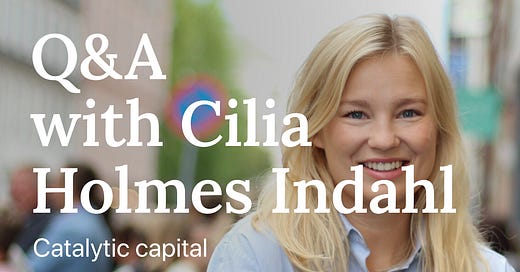Hello!
Today's issue revolves around impact investing. Impact investing is an investment strategy that aims to generate positive social and environmental impact alongside a financial return. In other words, it's about deploying capital for good.
The person here to tell you all about it is Cilia Holmes Indahl. She's the CEO of EQT Foundation, an impact-first investor and incubator providing catalytic capital to entrepreneurs building a more inclusive and regenerative tomorrow. Cilia is also a non-profit founder, having co-founded Sustainability Hub Norway in 2016 to help companies integrate sustainability into their strategies.
I met Cilia at a women's startup event late last year and jumped at the chance to interview her. She's bright, unwavering, and frank. I've learned a lot from her already and am sure you will too.
You've been interested in social impact and sustainability since you were a student. What sparked the interest?
I was an inquisitive child who loved taking things apart and putting them together to understand how they worked. I loved solving puzzles, and the older I got, the more evident it became that one of our biggest puzzles is how to live as one with the planet. The first eye-opener came in 2009 when researching a philosophy assignment and stumbling upon an argument from Aristotle. Aristotle reasoned that the placement of physical matter in areas where it does not belong creates chaos in the universe. I remember thinking, "Wow, we humans are just walking around creating chaos". In that moment, I decided my life would be about finding alternatives to creating chaos. Sustainability is, in its essence, a pathway to placing things correctly.
The first mission of my career was to convince companies that integrating sustainability into their business model would drive long-term financial performance. The second mission, which I embarked on when joining EQT, is to show how new ways of investing can be both more meaningful and value-generating. Our financial system has yet to return the full upside from impact investing. Climate startups are starting to prove it: they can now access an additional revenue stream for providing carbon offsets to the market. And we will likely see the same development with biodiversity credits. I hope we will find a way to see equivalent development in solving social issues.
Let’s talk about capitalism. The economist Mariana Mazzucato has argued that "rethinking capitalism means rethinking the role of the public sector, the role of the private sector, the role of finance, and the relationship between them all." Do you agree that we need to rethink capitalism? If yes, why? And how should these relationships between sectors evolve?
To me, it is more about redirecting than rethinking. I believe we should redirect capitalism by embedding societal and planetary value into financial performance metrics. Doing so changes the outcomes we are steering towards—allowing public, private, and financing institutions to take on new and more active roles. When we align financial flows with a greater purpose, we become more collaborative. This is what Mariana Muzzucato refers to as mission-driven economies.
Under this mission-driven model, the relationships between public, private, and financial institutions are evolving and improving. The public sector is largely the same, but with more pressure from citizens to transition. (Although this varies greatly from country to country). It's a similar story with the private sector. It's still aimed at maximising profitability, but its investment strategies are changing now that sustainability is recognised as a driver for financial performance. Financial institutions have moved from a passive role to a more active one, with products like sustainability-linked financing and green bonds incentivising sustainable investments. Technology has made it easier for financial players to collaborate, and new forms of investing are emerging to fill critical funding gaps. There's more coordination, too: public and philanthropic capital is being used to unlock more private investments, and the banks are facilitators for these new collaborations.
EQT Foundation provides risk capital to impact entrepreneurs. Risk capital is high-risk, high-reward investing. If these entrepreneurs' ideas contribute to a better tomorrow, what makes them so high risk?
Impact entrepreneurs bring more execution risk. Unlike conventional founders, impact entrepreneurs aren't just trying to build something that others are willing to pay for; they are building products and services with the potential to have a lasting positive impact for people and planet. Rather than building a minimum viable product (MVP) for where the customer is at today, they are building an MVP for where they want the customer to arrive tomorrow.
Changing the world for the better is ultimately about changing hearts and minds. Impact entrepreneurs might be developing an entirely new climate technology that cannot work standalone and instead requires a whole system to change. Or trying to tackle a social issue by serving a new customer base at lower margins and potentially higher volumes. That's a very different game from software products, which venture capitalists have long favoured due to software's ability to scale fast.
On top of that, impact companies can also bring a monetization risk. So when a VC decides to invest, they're also betting that the markets will get better at putting a dollar value on impact.
Two good examples in our portfolio are Living Carbon and Molecular Attraction. Both of these companies work on physical products. Living Carbon has figured out how to bio-engineer trees to grow 40% faster, capture more carbon, and deliver better quality wood. Molecular Attraction has developed a bio-attractant that can control the spread of malaria by attracting mosquitos away from human beings without pesticide use and affecting other species. Building for the physical world takes longer to scale than building for the digital world. But the demand and urgency behind these two ideas mean they can be just as, if not more, profitable than a digital product.
Taking bolder risk ties into one of your passion concepts: catalytic capital. Can you explain what it is and why we should care about it?
Catalytic capital is what it sounds like. It's bolder capital that enters into new areas to catalyse innovation, build a track record, and ultimately bring in additional investment that otherwise might not be possible. It is incredibly risk-tolerant and aims to reduce the risks for others entering into the investment. As a result, it is a powerful tool for encouraging larger investors to close funding gaps needed to foster an inclusive society and a regenerative planet.
How does catalytic capital relate to systemic investing? And is it an example of how to redirect capitalism?
Catalytic investing is motivated by the interplay between multiple investors; it is inherently relational. So in that sense, it's a teaser for systemic investing, where different investors join forces to solve a problem or challenge from multips angles of the financing landscape.
Systemic investing is powerful because it can shift the minds of investors—from single standalone targets to a group of interconnected players that all need to succeed for a single investment to succeed. Today, investors are often specialised within a certain asset class or investment stage, searching the market for the investments that fit their individual scope. In systemic investing, by contrast, a set of investors and funders come together to invest at different levels of the system that needs changing.
Let's take the green transition in mobility as an example. The policy incentives and public spending on charging infrastructure have made it easier for private investors to bet on electric vehicles. More private capital then moves into the space, which leads to more innovation and better solutions.
Systemic investing will be an important tool for successful systems change. Especially across industries where collaboration and joint standards are key to leap towards a better future. It requires more upfront planning and thought, but it will be worth it.
Imagine you are the only investor in the electronic consumer goods industry aiming to transition a company towards circularity. If the industry fails to transition, your investment will fail. Your infrastructure for taking back used goods will be expensive and inefficient, there will be few service providers for repairs, and you will most likely have to ship to a neighbouring country to retrieve the value from returned goods. Your products will be of higher quality, but also higher cost to produce, and your margins might be lower than competitors. Compare that to when an entire industry aligns on a mission to become sustainable. Everyone shares the risk and the cost of transition, so there's a vested interest in making it succeed. Either all of us lose, or all of us win.
Collaboration will be the bedrock of our new economy.
How can the tech and non-profit sectors come closer together?
More philanthropic funding should go to building strong, digital-first non-profits. There's huge potential to deliver impact at scale through digital technology, but it's usually out of reach for the non-profit sector.
A great example from our grant portfolio is Lalafo, a tech platform for acquiring used goods. After the invasion of Ukraine, the founder started a non-profit using the same technology to better match refugees with donated goods. This way, the refugees could search online for the goods they needed and get it delivered. No more standing in line at a warehouse hoping to find the right size of shoes in a pair of cardboard boxes—a massive improvement in dignity for displaced people.
EQT Foundation gave the Lalafo founder a grant to kick-start this non-profit. This type of donation represents something we call active philanthropy. Active philanthropy builds on EQT'S legacy of active ownership in investing, where you work together with management to improve the company's ability to create value for society and deliver even more value in the future. With this type of support, investors have ownership and skin in the game; that's not very common in the non-profit sector. Instead, the typical grant arrangement is, "I give you x amount of money in exchange for helping x amount of people." With it comes a between-the-lines expectation to not pay out salaries or build the organization. I'd like to see the impact of more active philanthropy on the sector.
What three books or other media have had the most significant impact on you as a leader and why?
Essentialism: the Disciplined Pursuit of Less by Greg McKeown. The best book I have read on intentional living. How to become the editor of your own life and sort out the non-essentials, learn to say no, and prioritize the stuff that makes you happy.
The First 90 days by Michael D. Watkins. A book I read prior to starting a new job or position. It helps you to prioritize learning, seek out early wins, and navigate in a new organization.
The Knowledge Project podcast - Episode 130 with Diana Chapman. A great episode on feedback, our ability to choose whether or not we want to get hurt, and allowing our instincts to guide us in leadership. It brilliantly combines emotional maturity with mindful leadership.
Got questions for Cilia? Or an impact breakthrough to pitch? She’s on LinkedIn and Instagram.
If you enjoyed this Q&A, you might like this one with Nille Skalts on the B-Corp movement 👇
See you in two weeks!
Lauren






What a great article. I really enjoyed reading your interview with Cilia. Such an opportunity to work together, more effectively, more sustainably, more positively for all.